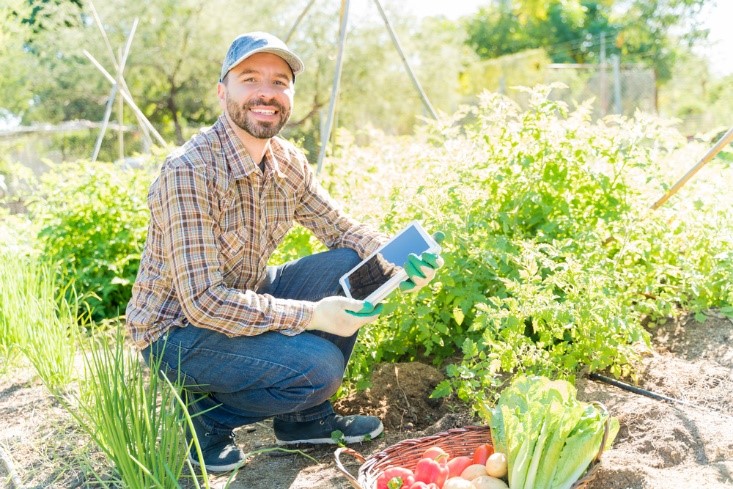International technology and agricultural leaders will analyze strategies to bridge the rural digital divide in the Americas

San Jose, 15 February 2021 (IICA). Starting this Tuesday, a series of virtual forums will be held with high-level public authorities, academics and private sector representatives to encourage countries in Latin America and the Caribbean to reduce the digital divide in rural areas and enable them full access to connectivity, which is a key issue that has been identified in the preparatory process for the UN Food Systems Summit.
Organized by the Inter-American Institute for Cooperation on Agriculture (IICA), the forums will begin this February 16 and will include four sessions, under the title “Bridging the Digital Divide in Rural Areas of Latin America and the Caribbean: Towards a Digital Agricultural Revolution”.
The objective of the webinar series is to encourage countries to fully harness the benefits of technological progress, striving to leave no-one behind in rural areas of the hemisphere.
Paola Vega, Minister of Science, Technology and Telecommunications of Costa Rica; and Samantha Marshall, Minister of Social Transformation, Agriculture, Lands and Fisheries of Antigua and Barbuda, will participate in the seminars.
Participating experts will include Maryleana Méndez, Executive Director of the Inter-American Association of Telecommunication Enterprises (ASIET); Pablo Palacios, Program Officer at the International Telecommunication Union (ITU); and company representatives, such as Bayer’s Global Head of Food Security, Ronald Guendel, and Germán Otálora, Manager of Microsoft’s Airband Initiative program for Latin America, among others.
The forums are part of IICA’s ongoing efforts to drive rural connectivity, which is an indispensable condition and a priority, in order to facilitate the development of production, social, and community life in rural areas. The Institute also considers that technological transformations and their application in rural production, along with the ensuing economic benefits, call for the promotion of policies and initiatives that bridge the rural connectivity divide.
Recently, as part of this effort, IICA, the IDB, and Microsoft presented the study, “Rural Connectivity in Latin America and the Caribbean – a Bridge to Sustainable Development During a Pandemic”, which indicated that at least 77 million people in rural Latin America and the Caribbean have no access to connectivity services at the minimal standards of quality.
The forums will also aim to exchange information on opportunities and challenges in digitalization to contribute to a more inclusive agriculture and rural sector, while sharing experiences about the use of technological tools in rural areas, focusing specifically on their impact on family farmers, indigenous people, youth and women.
The sessions will be entitled “Importance, Challenges and Opportunities in the Digital Divide” (Tuesday, 16 February), “Public Policies to Overcome It” (Thursday, the 18th), “Experiences in Digital Agriculture” (Tuesday, the 23rd) and “Elements for a Joint Roadmap” (Thursday, the 25th).
Director General of IICA, Manuel Otero, who will participate in the forums, commented that, “This is an issue that is vital to the future of our rural areas and the harmonious development of all of Latin America and the Caribbean. Connecting rural areas should be a top priority in public agendas and a task that should fall to governments, the private sector, civil society and cooperation agencies”.
“We are facing an important paradigm shift and we need to reflect and act. Thus, IICA’s convening of these sessions is timely and could provide a magnificent impetus for the necessary digitalization process. We must develop a support ecosystem and enlist the cooperation of countries, actors, institutions, businesses and projects”, said José Emilio Guerrero, researcher at the University of Córdoba, Spain.
Rolando Flores Galarza, Dean of New Mexico State University commented that, “Producers are the ones that are most affected by the lack of digital access (…). We are working to make this connection more feasible, because there will be increasing implications for agriculture, from the perspective of access to information and the application of technology in agriculture and livestock rearing”.
Another of the aspects to be analyzed is how the current pandemic has triggered a crisis that has created an unexpected and daunting challenge for societies”.
“The pandemic has revealed the importance of new technologies, which have played a key role in mitigating its worst effects, by creating conditions to enable sectors of the economy with the capacity to operate virtually to remain active”, added Otero.
We will meet to find a solution and to transform this issue into an opportunity, to enable Latin America and the Caribbean to fuel more development and resolve the major problems of humanity, such as climate change and the provision of healthy and sustainable food to the entire world population”, said Federico Meyer, Founder and CEO of Club Agtech (Argentina).
It is hoped that this series of forums will facilitate the development of elements for future projects that will enable the execution of joint actions for awareness-building, dissemination, appropriation, training, productive use, empowerment and the overall digital literacy of rural areas in Latin America and the Caribbean.
The forums will be transmitted, starting at 9:30 a. m. Costa Rica time (-6 GMT) via the IICA Facebook page, and on its YouTube channel.
More information:
Institutional Communication Division of IICA.
comunicacion.institucional@iica.int